新世纪研究生公共英语教材阅读BUnit
- 格式:doc
- 大小:113.00 KB
- 文档页数:24
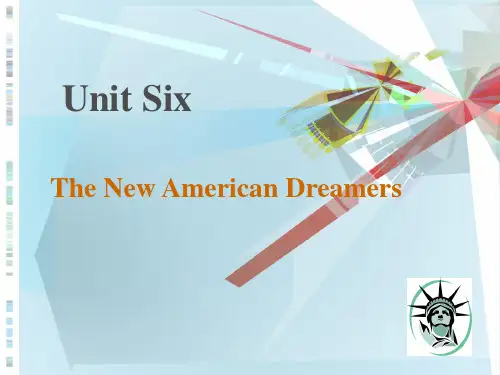
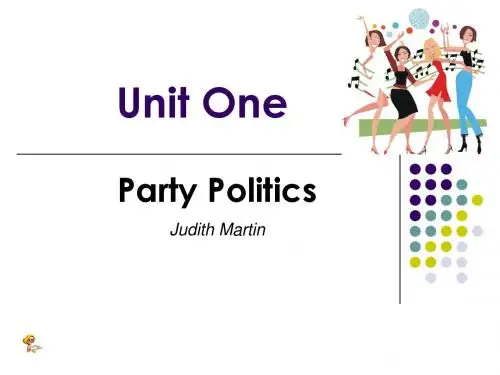
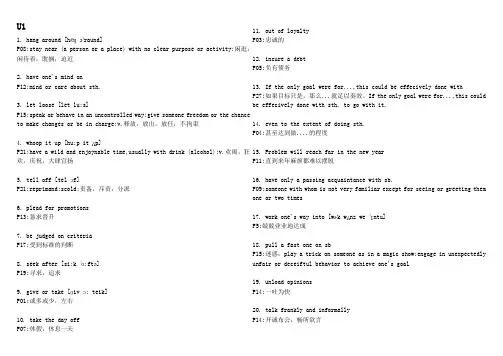
U1 1. hang around [hæŋ əˈraund] P08;stay near (a person or a place) with no clear purpose or activity;闲逛; 闲待着;耽搁;迫近 2. have one's mind on P12;mind or care about sth. 3. let loose [let lu:s] P15;speak or behave in an uncontrolled way;give someone freedom or the chance to make changes or be in charge;v.释放,放出,放任;不拘束 4. whoop it up [hu:p it ʌp] P21;have a wild and enjoynable time,usually with drink (alcohol);v.欢闹,狂欢,庆祝,大肆宣扬 5. tell off [tel ɔf] P21;reprimand;scold;责备,斥责;分派 6. plead for promotions P13;恳求晋升 7. be judged on criteria P17;受到标准的判断 8. seek after [si:k ˈɑ:ft ə] P19;寻求,追求 9. give or take [ɡiv ɔ: teik] P01;或多或少,左右 10. take the day off P07;休假;休息一天11. out of loyalty P03;忠诚的 12. incure a debt P05;负有债务 13. If the only goal were for...,this could be effecively done with P27;如果目标只是,那么...就足以奏效。
If the only goal were for...,this could be effecively done with sth. to go with it. 14. even to the extent of doing sth. P04;甚至达到做....的程度15. Problem will reach far in the new year P11;直到来年麻烦都难以摆脱 16. have only a passing acquaintance with sb. P09;someone with whom is not very familiar except for seeing or greeting them one or two times 17. work one's way into [w ɚk w ʌnz we ˈɪntu] P5;兢兢业业地达成 18. pull a fast one on sb P15;迷惑;play a trick on someone as in a magic show;engage in unexpectedly unfair or deceiftul behavior to achieve one's goal 19. unload opinions P14;一吐为快 20. talk frankly and informally P14;开诚布公,畅所欲言21. seek out [si:k aut]p12; 找出;物色;找到22. cut through [kʌt θru:]p13; 穿过,挤进23. be condemned forP24;被谴责24. be aware of [bi: əˈwɛəɔv]P4; v.知道意识到25. by the time [bai ðə taim]P12; 到…时候为止;等到;比及26. step out of the wayP09; 让开,避开;闪;躲开;躲闪27. let sb down gentlyP;放低;放下;使失望;失信28. peter out [ˈpi:tə aut]v.逐渐消失29. socialize/mix/mingle withP8;打成一片30. mix with [miks wið]P8; (使)与…混[结]合;与(某人)交往,在(人群)中周旋31. straight out [streit aut]坦白地,率直地,毫不犹豫地32. take…… at face valueP;信以为真33. delight in [diˈlait in]P3; 喜欢…,以…为乐;深嗜笃好;赏玩34. take up [teik ʌp]P6;拿起;继续;接受(提议);占去35. deliver practiced wordsP9;说事先准备好的话36. promote workday concernP12;促进工作的关注37. offer constructive criticiamP14;进谏38. adhere toP16;坚持U21. come of age [kʌm ɔv eidʒ]P5;满法定年龄;成年;成熟;发达2. rule out [ru:l aut]P9;不考虑;用直线划掉;宣布…不可能,排除…的可能性3. yearn for [jə:n fɔ:]P10;v.渴望;怀;怀想;向往4. do sth. once too oftenP13;这一次未能幸免;多次成功这次受挫5. hook up [huk ʌp]P13;get connected;meet up with someone6. small wonder [smɔ:l ˈwʌndə]P14;不太出奇; no wonder;not surprising ;naturally7. hung over [hʌŋˈəuvə]P15;[美国俚语]因宿醉(或过量吸毒)而感到难受8. fork out [fɔ:k aut]P15;(不情愿)支付;交出9. pitch in [pitʃ in]P17;投入;参与10. opt for [ɔpt fɔ:]P13;v.选择;choose (a paticular thing)rather than any other11. waiting list [ˈweɪtɪŋ list]P18;n.候补申请人名单12. in (the) place ofP2;代替;取代13. rave about [reiv əˈbaut]P2; v.倾倒;极力赞赏;极力夸奖14. wreak havoc on sthP3; 在某事上肆虐; 产生巨大冲击15. remain on one's ownP3;保持着独自生活的状态16. a host of [ei həust ɔv]adj.许多一大群17. scout around [skaut əˈraund]侦察18. rest up [rest ʌp]P7; (使)得到充分休息;休养,休息19. account for [əˈkaunt fɔ:]P10; 说明(原因、理由等);导致,引起;(在数量、比例上)占;对…负责20. live a self-determined lifeP7; 过自己想要的生活21. groan with [ɡrəun wið]P14; 由于…而呻吟;摆满22. spring up [spriŋʌp]P10; P15; 跳起;跃起;迅速成长;非正突然开始23. stiletto heel [stɪˈletəʊ hi:l]P15; n.女式高跟皮鞋的;细鞋跟24. the holy grailP14; 圣杯,某人梦寐以求的东西25. dust bunnyP13; 尘屑;a small ball of hair and dust that forms in a place that is not cleaned regularly, such as under furnitureU31. go along with [ɡəu əˈlɔŋwið]P40;v.一起去,赞同,附和2. an array of [æn əˈrei ɔv]P2; 一排,一群,一批3. double-edged sword [ˈdʌbəlˈedʒd sɔ:d]P1;双刃剑;好坏掺半的东西4. ICU [,aisi:'ju:]P1; abbr.intensive care unit 特护病房5. wonder drug [ˈwʌndə drʌɡ]P1; [医]特效药6. radiation therapy [ˈreidiˈeiʃən ˈθerəpi] P1; 放射治疗,放射疗法7. in limbo [in ˈlɪmbəʊ]P2; 身陷囹圄;处于不稳定(或中间过渡)状态8. be put on probation forP13; 被缓刑9. spina bifida [ˈspaɪnəˈbɪfɪdə]P14; n.脊柱裂10. come at a priceP15; 是有代价的11. emerge with P15; 出现,伴有12. under siege [ˈʌndə si:dʒ]P21; (某地)处在包围之中13. bowl movementP18; 大便;排便14. teaching hospital [ˈti:tʃɪŋˈhɔspitəl] n.教学医院,医学院的附属医院15. on the ground [ɔn ðəɡraund]P24; adv.在地上,当场,在决斗;席地;地下16. cease to functionP3; 停止运转17. get down to [ɡet daun tu:]P5; 开始认真处理,对待18. take over [teik ˈəuvə]P9; 接管;接任;接手19. bring sb. back to the agonyP11; 使某人回到痛苦20. sth. is not good grounds for...P16; 对于...不是好的理由21. at all costs [æt ɔ:l kɔsts]P18; 不惜任何代价;不惜工本22. be charged withP20; 被控告;承担23. pull back [pul bæk]P8; P24;(使)(某人,尤指一组士兵)撤出阵地;使撤退,使撤离24. cut off food and waterP20; 停止了食物和水源供应25. enjoy acess toP23; 享有26. grapple withP19; struggle with27. under the guise ofP12; 以...作为愰子28. in the wake ofP4; following29. give new birth toP;U41. look on [luk ɔn]P5;regard or consider sth. in a certain way; 在一旁观看,袖手旁观;把眼光投向[以某种观点来看待或对待](某物或某人);看热闹2. get around [ɡet əˈraund]P3;能各处走动;随意走走;3. lay out [lei aut]P3; 设计;展示;安排;陈设;布置4. essence of beauty [ˈesns ɔv ˈbju:ti]P2; 美的本质5. make sense [meik sens]P3; 讲得通;有意义;有道理;是明智的6. follow... patterns in viewing sth. as sth. P1; 采用...的思维模式把...看待成...7. develop in the opposite directionP2; 朝着相反的方向发展8. give meaning toP2; 赋予意义9. in contrastP4; 相反地10. paste paper over the windowsP4; 纸贴在窗户上11. take place inP4; 发生在12. in relation toP5; 与...有关13. depend on [diˈpend ɔn]P6; 依赖;相信;信赖;随…而定;14. be filled withP2; 充满着;怀着;盈;15. leave sth. unsaidP2; 留白;意犹未尽16. make perfect sense to sb.P2; 颇为合理;有意义;可理解17. infringe onP7; 侵犯,侵害,破坏U51. yuk it upP6; laugh an joke heartedly,esp. continuously;边笑边开玩笑2. fly into a rage [flai ˈɪntuː ei reɪdʒ]P10; 勃然大怒;火冒三丈;发怒;suddenly become very angry3. ground sb. in sth.P26; 打好基础;教以基本知识4. warm up toP29; 更加喜欢;对……更有兴趣或更热心5. roll one's eyesQuote;眼珠一转示意生气6. sit in rapt attentionP1; 全神贯注地坐着7. nuclear family [ˈnju:kliəˈfæmili]P7; 核心家庭,小家庭,基本家庭(只包括父母和子女的家庭)8. be consumed with P4; v.被…吞噬;充满; 一心只想9. call sb. namesP8; v.辱骂某人;用各种难听的话骂(某人)10. right or wrong [rait ɔ: rɔŋ]P11; adv.不管如何;无论对错11. urge to [ə:dʒ tu:]P11; to do 鼓励(某人)朝着(某方向努力)12. strive to [straiv tu:]P8; to do 力图;力求13. practice good mannersP15; 有良好的举止14. raise one's voice to sb.P16; 对某人提高嗓门15. plunk onself downP21; sit down heavily and then relax16. shut off [ʃʌt ɔf]P25; 停止;关掉;隔绝;使不进入17. draw on [drɔ: ɔn]P26; 利用;凭借;(时光)渐渐过去,荏苒18. board game [bɔ:d ɡeim]P27; n.用棋盘玩的游戏19. comic relief [ˈkɔmik riˈli:f]P6; n.喜剧性穿插,喜剧性调剂;轻松镜头20. pull up [pul ʌp]P21; (使)停下(住);责备;(使)名次提前;从土里拔出来U61. figure out [ˈfiɡə aut]P1; 想出;理解;明白;计算出,解决;弄明白;合计2. tie down [tai daun]P4; 捆住,束缚,约束,牵制;牵累3. the end of the rainbowP8; 实现愿望之地;美梦成真之所4. buy into [bai ˈɪntuː]P12; 信从,接受,买进5. drug rehabitationP13; 戒毒6. caught upP16; involved, included, or captivated, often against one's wishes; 卷入;陷入;迷住7. upward mobility [ˈʌpwəd məʊˈbɪlɪti:]P11; 向较高或较富有的社会阶层的流动;向上爬;8. be committed to [bi: kəˈmɪtɪd tu:]P1; 献身于,致力于;(后接名词或动名词,to是介词)9. take control of sth. P1; 控制10. in all probability [in ɔ:l ˈprɔbəˈbiliti] P1; 十之八九,很可能11. play a role in [pleɪ ei rəul in]P2; 在…起作用12. start on [stɑ:t ɔn]P3; v.开始进行,找机会与…吵架13. do child careP4; 照顾孩子14. do sth as a favorP4; 做某事帮个忙15. make a movieP4; 拍一部电影;拍摄电影16. draw to [drɔ: tu:]P5; 使(某人)对…感兴趣;把…拉到…旁17. set out [set aut]P7; 动身;出发;着手;安排18. prior to [ˈpraiə tu:]P7; 在…之前19. drug rehabilitationP13; [医]药物康复20. fifty-fifty [ˈfiftiˈfifti]P15; adj.平分为二的adv.对半地,平分为二分地21. have a fundamentally optimistic attitude toward P17; 有一个根本的乐观态度22. look toward the future P2; 展望未来23. be urged to do sth. P17; 敦促24. sum up [s ʌm ʌp]P17; 是…的总和[数];合计;总结,概括;向陪审团概述案情;25. be in control of [bi: in k ən ˈtr əul ɔv] P18; 柄;执掌U7 1. develop/have a chip on one's shoulder P1; (因感到自己的过去或背景等使人产生偏见而)怀恨,不满,对抗;怀有恶劣的情绪 2. seed money [si:d ˈm ʌni] P6; the money one has to start a new business with 3. ride the wave P6; work smoothly or successfully; use luck or success to achieve more success; go with the trend 4. toy with [t ɔi wið] P7; 玩弄…;心不在焉地耍弄;不认真考虑… 5. get rid of [ɡet rid ɔv] P7;摆脱6. round off [raund ɔf] P10; 圆满完成;结束7. bounce off the wallsP10; act unreasonably or crazily8. peter out [ˈpi:t ə aut]P14; v.逐渐减弱,消失,耗尽,使筋疲力尽9. carp about/atP1;抱怨;挑剔;吹毛求疵10. take over [teik ˈəuv ə]P1; 带;接管;帮…学习;在…上花费;11. appear to [əˈpi ə tu:]P2; 似乎,好像12. home run [h əum r ʌn] P6; n.本垒打 13. say with a shrug p8; 耸耸肩说 14. gear up [ɡi ə ʌp] P11; 换高速挡;改进…以适应提高生产的需要;使做好行动准备 15. enforce loyalty to sb P11; 对... 加强忠诚 16. disapprove of [ˈd ɪs əˈpru:v ɔv]P12; v.不同意17. mull over [mʌl ˈəuvə]P13; n.岬,海角;认真琢磨,反复思考18. chat up [tʃæt ʌp]P14; 闲谈;19. tease sb about sthP14; 取笑某人某事20. whiz throughP4; 快速移动,迅速完成21. cut to the chase [kʌt tu: ðə tʃeis]P4; get to the point ; get to the important or crucial part; 美俚说话直接22. put up with [put ʌp wið]P6; 忍受,容忍;容受;忍得住;将就U81. keep ... under controlP1; keep ... happening in the way you want2. come about [kʌm əˈbaut]P4; happen,esp. in a way that is not planned; 发生;改变方向;3. not to mention [nɔt tu: ˈmenʃən]P20; 更不用说;不消说4. attach ... to ...P21; connect ... with ... 5. let …off the hookP30; allow someone or help someone to get out of a difficult situation6. by virtue of [bai ˈvə:tju: ɔv]P32; by means of; as a result of; 凭借…的力量,由于[因为]7. be in one's interestP32; be the best thing for someone8. keep one in one's placeP33; make or play the correct role; force sb. to remain in their traditional role9. condense sth. into sth.P33; make sth. that is spoken or written shorter by not giving as much detail or using fewer words to give the same information10. in short [in ʃɔ:t]P7; 简而言之,总之;一句话;简言之11. play a role in [pleɪ ei rəul in]P12; 在…起作用12. give sb an advantage inP14; 给某人一个优势13. and so forth [ænd səʊ fɔ:θ]P14; 等等;诸如此类;什么的;依此类推14. in terms ofP15; 根据;用…的话;就…而言;以…为单位15. be prone to [bi: prəun tu:]P2;P20; v.有…的倾向,易于16. by contrast [bai ˈkɔntræst]P20;P21; 相比之下;相形之下17. be attached to [bi: əˈtætʃt tu:] P21; v.附属于,喜爱;爱慕18. meet with disapprovalP25; 遇到反对意见19. display an interest in doing sth P25; 显示对做某事感兴趣20. in the guiseP29; 在伪装21. be critical of [bi: ˈkritikəl ɔv] P31; v.不满22. It is in one's interest to do sth P32; 做某事是某人的兴趣23. exclude from [iksˈklu:d frɔm]P32; 把…排斥[排除]于…之外24. role model [rəul ˈmɔdəl]n. 榜样;模范25. be complacent aboutP29; 自满的26. beam with prideP25; smile happily because of pride 27. associate sb./sth. withP27; 与…交往,联系28. the minuteP26; at the moment29. dressing upa children's game in which they put on special clothes and pretend that they are someone else; 角色扮演;乔装打扮30. be perceived asP26; 被视为;被认为是。
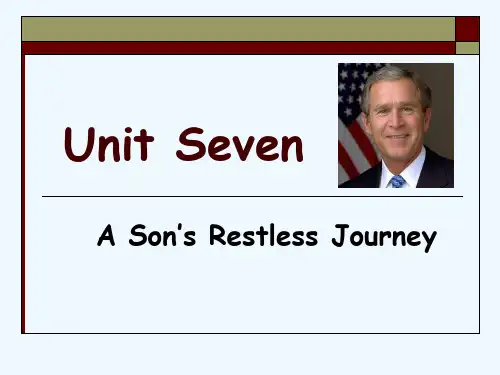
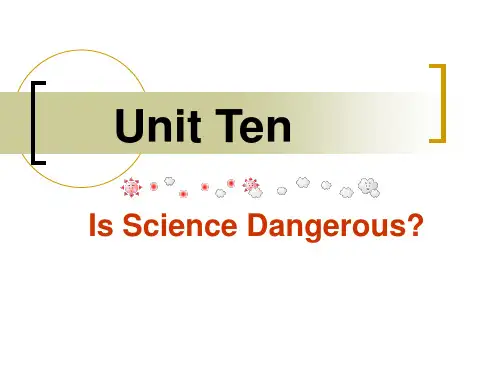
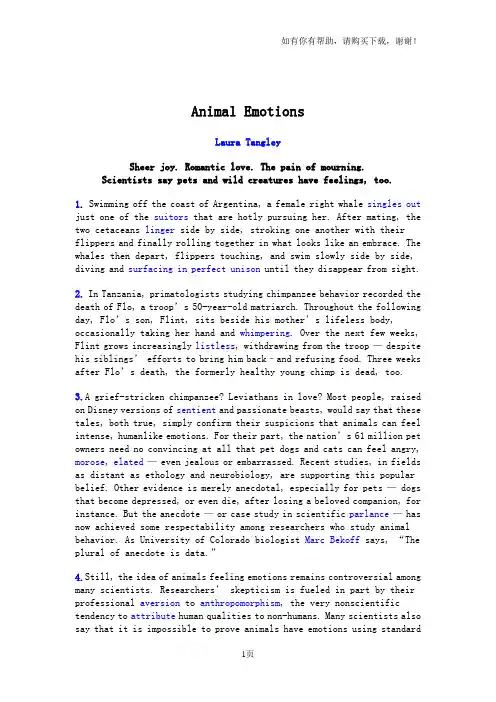
Unit 9Animal EmotionsLaura TangleySheer joy. Romantic love. The pain of mourning.Scientists say pets and wild creatures have feelings, too.1. Swimming off the coast of Argentina, a female right whale singles out just one of the suitors that are hotly pursuing her. After mating, the two cetaceans linger side by side, stroking one another with their flippers and finally rolling together in what looks like an embrace. The whales then depart, flippers touching, and swim slowly side by side, diving and surfacing in perfect unison until they disappear from sight.2.In Tanzania, primatologists studying chimpanzee behavior recorded the death of Flo, a troop’s 50-year-old matriarch. Throughout the following day, Flo’s son, Flint, sits beside his mother’s lifeless body, occasionally taking her hand and whimpering. Over the next few weeks, Flint grows increasingly listless, withdrawing from the troop —despite his siblings’ efforts to bring him back–and refusing food. Three weeks after Flo’s death, the formerly healthy young chimp is dead, too.3.A grief-stricken chimpanzee? Leviathans in love? Most people, raised on Disney versions of sentient and passionate beasts, would say that these tales, both true, simply confirm their suspicions that animals can feel intense, humanlike emotions. For their part, the nation’s 61 million pet owners need no convincing at all that pet dogs and cats can feel angry, morose, elated—even jealous or embarrassed. Recent studies, in fields as distant as ethology and neurobiology, are supporting this popular belief. Other evidence is merely anecdotal, especially for pets — dogs that become depressed, or even die, after losing a beloved companion, for instance. But the anecdote —or case study in scientific parlance—has now achieved some respectability among researchers who study animal behavior. As University of Colorado biologist Marc Bekoff says, “The plural of anecdote is data.”4.Still, the idea of animals feeling emotions remains controversial among many scientists. Researchers’ skepticism is fueled in part by their professional aversion to anthropomorphism, the very nonscientific tendency to attribute human qualities to non-humans. Many scientists also say that it is impossible to prove animals have emotions using standard scientific methods —repeatable observations that can be manipulated incontrolled experiments —leading them to conclude that such feelings must not exist. Today, however, amid mounting evide nce to the contrary, “the tide is turning radically and rapidly,” says Bekoff, who is at the forefront of this movement.5.Even the most strident skeptics of animal passion agree that many creatures experience fear —which some scientists define as a “primary” emotion that contrasts with “secondary” emotions such as love and grief. Unlike these more complex feelings, fear is instinctive, they say, and requires no conscious thought. Essential to escape predators and other dangers, fear — and its predictable flight, fight, or freeze responses — seems to be hard-wired into many species. Young geese that have never before seen a predator, for example, will run for cover if a hawk-shaped silhouette passes overhead. The shape of a nonpredatory bird, on the other hand, elicits no such response.6.But beyond such instinctual emotions and their predictable behavioral responses, the possibility of more complex animal feelings —those that entail mental processing —is difficult to demonstrate. “I can’t even prove that another human being is feeling happy or sad,” says Bekoff, “but I can deduce how they’re feeling through body language and facial expression.” As a scientist who has conducted field studies of coyotes, foxes, and other canines for the past three decades, Bekoff also believes he can accurately tell what these animals are feeling by observing their behavior. He adds that animal emotions may actually be more knowable than those of humans, because they don’t “filter” their feelings the way we do.7.Yet because feelings are intangible, and so tough to study scientifically, “most researchers don’t even want to talk about animal emotions,” says Jaak Panksepp, a neuroscientist at Bowling Green State University in Ohio and author of Affective Neuroscience. Within his field, Panksepp is a rare exception, who believes that similarities between the brains of humans and other animals suggest that at least some creatures have true feelings. “Imagine where we’d be in physics if we hadn’t infer red what’s inside the atom,” says Panksepp. “Most of what goes on in nature is invisible, yet we don’t deny that it exists.”8.The new case for animal emotions comes in part from the growing acceptability of field observations, particularly when they are taken in aggregate. The latest contribution to this body of knowledge is a new book, The Smile of a Dolphin, which presents personal reports from more than 50 researchers who have spent their careers studying animals —from cats, dogs, bears, and chimps to birds, iguanas, and fish. Edited by Bekoff, who says it will finally “legitimize” research on animal emotions, thevolume has already garnered scientific attention, including a Smithsonian Institution symposium on the subject.9. One of the most obvious animal emotions is pleasure. Anyone who has ever held a purring cat or been greeted by a bounding, barking,tail-wagging dog knows that animals often appear to be happy. Beastly joy seems particularly apparent when the animals are playing with one another or sometimes, in the case of pets, with people.10.Virtually all young mammals, as well as some birds, play, as do adults of many species such as our own. Young dolphins, for instance, routinely chase each other through the water like frolicsome puppies and have been observed riding the wakes of boats like surfers. Primatologist Jane Goodall, who has studied chimpanzees in Tanzania for four decades, says that chimps “chase, somersault, and pirouette around one another with the abandon of children.” In Colorado, Bekoff once watched an elk race back and forth across a patch of snow — even though there was plenty of bare grass nearby —leaping and twisting its body in midair on each pass. Though recent research suggests that play may help youngsters develop skills needed in adulthood, Bekoff says there’s no question that it’s also fun. “Animals at play are symbols of the unfettered joy of life,” he says11.Grief also seems to be common in the wild, particularly following the death of a mate, parent, offspring, or even close companion. Female sea lions witnessing their pups being eaten by killer whales are known to actually wail. When a goose, which mates for life, loses its partner, the bird’s head and body droop dejectedly. Goodall, who saw the young chimp Flint starve after his mother died, maintains that the animal “died of grief.”12.Elephants may be nature’s best-known mourners. Scientists studying these behemoths have reported countless cases of elephants trying to revive dead or dying family members, as well as standing quietly beside an animal’s remains for many days, periodically reaching out and touching the body with their trunks. Kenyan biologist Joyce Poole, who has studied African elephants since 1976, says these animals’ behavior toward their dead “leaves me with little doubt that they experience deep emotions and have some understanding about death.”13.But there’s “hard” scientific evidence for animal feelings as well. Scientists who study the biology of emotions, a field still in its infancy, are discovering many similarities between the brains of humans and other animals. In animals studied so far, including humans, emotions seem to arise from ancient parts of the brain that are located below the cortex,regions that have been conserved across many species throughout evolution.14.The most important emotional site identified so far is the amygdala, an almond-shape structure in the center of the brain. Working with rats, neuroscientists have discovered that stimulating a certain part of the amygdala induces a state of intense fear. Rats with damaged amygdalas, on the other hand, do not show normal behavioral responses to danger (such as freezing or running) or the physiological changes associated with fear — higher heart rate and blood pressure, for example.15.In humans, brain-imaging studies show that when people experience fear, their amygdalas, too, are activated. And just like the rats, people whose amygdalas are damaged by accident or disease seem unable to be afraid when the situation warrants it. In humans and rats, at least, amygdalas are “basically wired the same way,” says New York University neuroscientist Joseph LeDoux, whose lab conducted much of the rat research. He adds that beyond fear, “the evidence is less clear, but the amygdala is implicatedin other emotions as well.”16.The case for animal emotions is also bolstered by recent studies of brain chemistry. Steven Siviy, a behavioral neuroscientist at Gettysburg College in Pennsylvania, has found that when rats play, their brains release copious amounts of dopamine, a neurochemical that is associated with pleasure and excitement in humans. In one experiment, Siviy placed pairs of rats in a distinctive plexiglass chamber and allowed them to play. After a week, he could put one animal alone in the chamber and, anticipating its upcoming play session, it would become “very active, vocalizing, and pacing back and forth with excitement.” But when S iviy gave the same animal a drug that blocks dopamine, all such activity came to a halt. Neuroscientist Panksepp has found evidence that rats at play also produce opiates–chemicals that, like dopamine, are thought to be involved with pleasure in people.17.Another chemical, the hormone oxytocin, is associated with both sexual activity and maternal bonding in people. It is released, for example, when mothers are nursing their infants. Now it looks as though the same hormone affects attachment among animals, at least in the case of a mouselike rodent called the prairie vole. To investigate oxytocin’s role in social bonding, University of Maryland neuroscientist C. Sue Carter targeted the vole because it is one of the few mammal species known to be monogamous. She found that females, who normally spend about a day selecting a mate from a pool of eager males, will choose one within an hour — often the first male they see —if they have first received an injection of oxytocin. Voles given a drug that blocks oxytocin, however, will not select a mate,no matter how much time they have. Carter concludes that pair bonding in voles relies at least in part on oxytocin, which produces behavior that looks much like people who are “falling in love.”18.But is it love, really? Bernd Welsig, the Texas A&M University biologist who observed amorous right whales off the coast of Argentina, believes that, as a scientist, “I should probably call this event a mere example of an ‘alternative mating strategy.’ “ But Welsi g still entertains the possibility that the cetaceans behaved the way they did because “they were the ‘right’ right whales for each other.”19.Skeptics remain unconvinced. “A whale may behave as if it’s in love, but you can’t prove what it’s feeling, if anything,” says neuroscientist LeDoux, author of The Emotional Brain. He maintains that the question of feelings boils down to whether or not animals are conscious. And though animals “may have snapshots of self-awareness,” he says, “the movie we call consciousness is not there.” Richard Davidson, a neuroscientist at the University of Wisconsin-Madison, agrees that higher primates, including apes and chimps, are the only animals that have demonstrated self-consciousness so far. Still, he believes that there are other creatures that “may at least have antecedents of feelings.”20.Or probably more, say Bekoff and his colleagues. Their most convincing argument, perhaps, comes from the theory of evolution, widely accepted by biologists of all stripes. Citing similarities in the brain anatomy and chemistry of humans and other animals, neuroscientist Siviy asks: “If you believe in evolution by natural selection, how can you believe that feelings suddenly appeared, out of the blue, with human being s?” Goodall says scientists who use animals to study the human brain, then deny that animals have feelings, are “illogical.”21. In the end, what difference does it really make? According to many scientists, resolving the debate over animal emotions could turn out to be much more than an intellectual exercise. If animals do indeed experience a wide range of feelings, it has profound implications for how humans and animals will interact in the future. Bekoff, for one, hopes that greater understanding of what animals are feeling will spur more stringent rules on how animals should be treated, everywhere from zoos and circuses to farms and backyards.22.But if there is continuity between the emotional lives of humans and other animals, where should scientists draw the line? Michel Cabanac, a physiologist at Laval University in Quebec, believes that consciousness arose when animals began to experience physical pleasure and displeasure. In experiments with iguanas, he discovered that the animals showphysiological changes that are associated with pleasure in mammals — a rise in body temperature and heart rate —whereas frogs and fish do not. He proposes that emotions evolved somewhere between the first amphibians and reptiles. Yet even enthusiasts don’t ascribe emotions to the very bottom end of the food chain. Says Bekoff: “We’re not going to talk about jealous sponges and embarrassed mosquitoes.”<The End>第九单元动物的情感劳拉·坦利非常的开心。
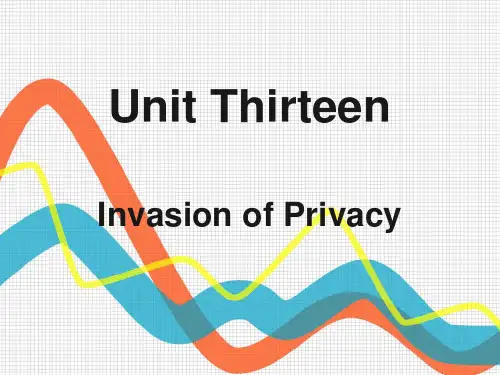
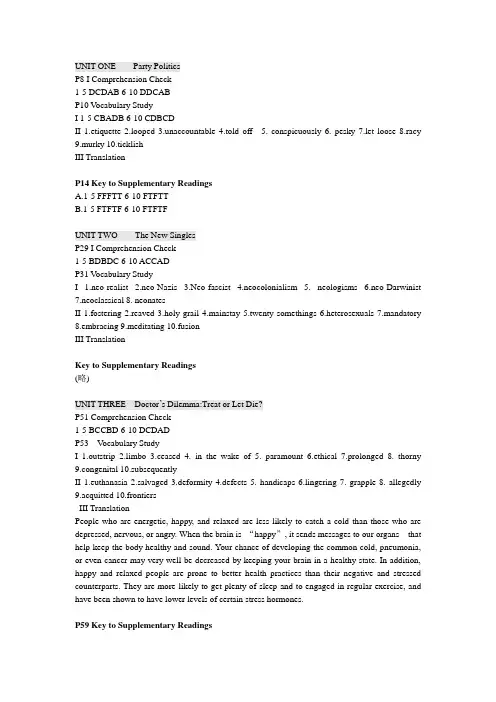
UNIT ONE Party PoliticsP8 I Comprehension Check1-5 DCDAB 6-10 DDCABP10 Vocabulary StudyI 1-5 CBADB 6-10 CDBCDII 1.etiquette 2.looped 3.unaccountable 4.told off 5. conspicuously 6. pesky 7.let loose 8.racy 9.murky 10.ticklishIII TranslationP14 Key to Supplementary ReadingsA.1-5 FFFTT 6-10 FTFTTB.1-5 FTFTF 6-10 FTFTFUNIT TWO The New SinglesP29 I Comprehension Check1-5 BDBDC 6-10 ACCADP31 Vocabulary StudyI 1.neo-realist 2.neo-Nazis 3.Neo-fascist 4.neocolonialism 5. neologisms 6.neo-Darwinist7.neoclassical 8. neonatesII 1.fostering 2.reaved 3.holy grail 4.mainstay 5.twenty-somethings 6.heterosexuals 7.mandatory 8.embracing 9.meditating 10.fusionIII TranslationKey to Supplementary Readings(略)UNIT THREE Doctor’s Dilemma:Treat or Let Die?P51 Comprehension Check1-5 BCCBD 6-10 DCDADP53 V ocabulary StudyI 1.outstrip 2.limbo 3.ceased 4. in the wake of 5. paramount 6.ethical 7.prolonged 8. thorny9.congenital 10.subsequentlyII 1.euthanasia 2.salvaged 3.deformity 4.defects 5. handicaps 6.lingering 7. grapple 8. allegedly 9.acquitted 10.frontiersIII TranslationPeople who are energetic, happy, and relaxed are less likely to catch a cold than those who are depressed, nervous, or angry. When the brain is “happy”, it sends messages to our organs that help keep the body healthy and sound. Your chance of developing the common cold, pneumonia, or even cancer may very well be decreased by keeping your brain in a healthy state. In addition, happy and relaxed people are prone to better health practices than their negative and stressed counterparts. They are more likely to get plenty of sleep and to engaged in regular exercise, and have been shown to have lower levels of certain stress hormones.P59 Key to Supplementary ReadingsA.1-5 FTFTF 6-10 TTTFTB.1-5 FFTTF 6-10 TFTFFC.UNIT FOUR The Cultural Patterning of SpaceP71 Comprehension Check1-5 BABCC 6-9 DDDBP73 V ocabulary StudyI 1-5 begja 6-10 hcifdII 1.anthropologists 2. Patterns 3.tangible 4. persistent 5. infringe 6. integrate 7. secular 8. spatial 9.florist’s 10.ArchitectureIII TranslationUNIT FIVE Can You Raise a Polite Kid in This Rude World?P94 Comprehension Check1-5 BDADB 6-9 AADBP95 V ocabulary StudyI 1-5 deigj 6-10 hfabcII 1.provocative 2. notional 3. curb 4.devastating 5. appalling 6.perspective 7. counterpart 8. fray 9.defuse 10.frustratedIII TranslationUNIT SIX The New American DreamersP115 Comprehension Check1-5 DEAAC 6-10 DCDABP117 V ocabulary StudyI outgoing 2.petite 3.emphatically 4.self-possessed 5. quest 6.personable 7. fantasized 8. buy into9.defer 10.caught upII 1.involved 2. committed 3. figure out 4. convinced 5.affluent 6. tied down 7. quest 8. the end of the rainbow 9.therapeutic 10. formulatingIII TranslationP126 Key to Supplementary ReadingsA.1-5 CCBDD 6-8 AAAB.1-5 FFFTF 6-10 TTTFTUNIT SEVEN A Son’s Restless JourneyP143 Comprehension Check1-5 ABDCB 6-8 DABP144 V ocabulary StudyI 1.carped 2. embodied 3. agonized 4. outright 5. peered 6.mediocre 7. inundated 8. bucked 9. snarling at 10.petered outII 1.obsolete 2.wince 3.grueling 4. whizzed through 5. pretentious 6.squelched 7.mull 8. jaded 9. misgivings 10. sanctuary 11.unfazed 12.posed 13.scoffed 14. misbehavedIII TranslationP150 Key to Supplementary ReadingsA.1-5 DCCDB 6-10 ABAABB. 1-5 FTFTF 6-10 FTTFF 11-15 TTFFFUNIT EIGHT Sex RolesP169 Comprehension Check1-5 DCABA 6-10 CCBADP171 V ocabulary StudyI 1-5 jhgab 6-10 idcfeII 1. aggressive 2. stereotyped 3. inhibit 4. masculine 5.disapproval 6.subsistence 7. speculate 8.perceive 9. socialize 10.proneIII TranslationP181 Key to Supplementary ReadingsA.B.1-5 TFFTT 6-9 TFTTUNIT NINE Animal EmotionsP193 Comprehension Check1-5 DADCC 6-10 BBACDP195 V ocabulary StudyI 1. parlance 2. stringent 3. ascribed 4. symposium 5. copious 6. aversion to 7. warrant 8. manipulated 9. garnered 10.lingeredII 1. hormones 2. predators 3.elated 4. elicited 5. entail 6. anecdotes 7. controversial 8. legitimize 9. wake 10.dejectedlyIII TranslationP200 Key to Supplementary ReadingsA.1-5 TTTTF 6-10 FTFFTB.1-5 TFFTT 6-10 FFTFTUNIT TEN Is Science Dangerous?P214 Comprehension Check1-5 BBDAC 6-10 BCADBP216 V ocabulary StudyI 1.standing by 2. conjured up 3. cherishes 4. stick to 5. shoulder 6. siblings 7. came by 8. dressing up 9.tyranny 10. come into playII 1. reverberates 2. appropriate 3. dispassionately 4. emphatically 5. rationed 6. enlightened 7. proscribed 8. blameworthy 9. confidentiality 10. implicationIII TranslationP222 Key to Supplementary ReadingsA.1-5 TTFFT 6-10 TFTTTB. 1-5 TFFFT 6-10 TFFFT。
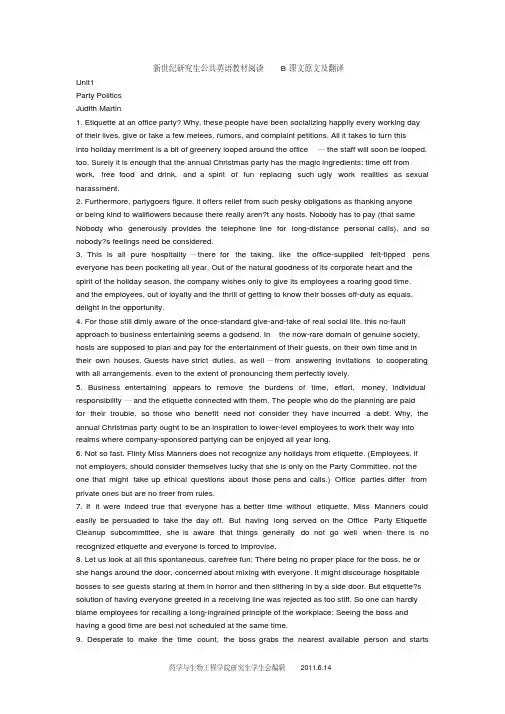
新世纪研究生公共英语教材阅读B课文原文及翻译Unit1Party PoliticsJudith Martin1. Etiquette at an office party? Why, these people have been socializing happily every working dayof their lives, give or take a few melees, rumors, and complaint petitions. All it takes to turn thisinto holiday merriment is a bit of greenery looped around the office—the staff will soon be looped, too. Surely it is enough that the annual Christmas party has the magic ingredients: time off from work, free food and drink, and a spirit of fun replacing such ugly work realities as sexual harassment.2. Furthermore, partygoers figure, it offers relief from such pesky obligations as thanking anyoneor being kind to wallflowers because there really aren?t any hosts. Nobody has to pay (that same Nobody who generously provides the telephone line for long-distance personal calls), and so nobody?s feelings need be considered.3. This is all pure hospitality—there for the taking, like the office-supplied felt-tipped pens everyone has been pocketing all year. Out of the natural goodness of its corporate heart and the spirit of the holiday season, the company wishes only to give its employees a roaring good time,and the employees, out of loyalty and the thrill of getting to know their bosses off-duty as equals, delight in the opportunity.4. For those still dimly aware of the once-standard give-and-take of real social life, this no-fault approach to business entertaining seems a godsend. In the now-rare domain of genuine society, hosts are supposed to plan and pay for the entertainment of their guests, on their own time and in their own houses. Guests have strict duties, as well—from answering invitations to cooperating with all arrangements, even to the extent of pronouncing them perfectly lovely.5. Business entertaining appears to remove the burdens of time, effort, money, individual responsibility—and the etiquette connected with them. The people who do the planning are paidfor their trouble, so those who benefit need not consider they have incurred a debt. Why, the annual Christmas party ought to be an inspiration to lower-level employees to work their way into realms where company-sponsored partying can be enjoyed all year long.6. Not so fast. Flinty Miss Manners does not recognize any holidays from etiquette. (Employees, if not employers, should consider themselves lucky that she is only on the Party Committee, not the one that might take up ethical questions about those pens and calls.) Office parties differ from private ones but are no freer from rules.7. If it were indeed true that everyone has a better time without etiquette, Miss Manners could easily be persuaded to take the day off. But having long served on the Office Party Etiquette Cleanup subcommittee, she is aware that things generally do not go well when there is no recognized etiquette and everyone is forced to improvise.8. Let us look at all this spontaneous, carefree fun: There being no proper place for the boss, he or she hangs around the door, concerned about mixing with everyone. It might discourage hospitable bosses to see guests staring at them in horror and then slithering in by a side door. But etiquette?s solution of having everyone greeted in a receiving line was rejected as too stiff. So one can hardly blame employees for recalling a long-ingrained principle of the workplace: Seeing the boss and having a good time are best not scheduled at the same time.9. Desperate to make the time count, the boss grabs the nearest available person and startsdelivering practiced words about the contribution he makes to their great enterprise. The reactionis not quite what was hoped for. Discreet questioning establishes that this is an employee?s guest.and, as a matterHe doesn?t work for the company, recognize the boss, or appreciate the attention—of fact, has only a passing acquaintance with the employee who issued the invitation. What thisguest wants is not professional fellowship but a fresh drink, if the boss would kindly step out ofthe way.10. Now, the reason the invitation said “and guest” was to avoid the ticklish issue of who is still married to whom and what the spouse calls itself. Last year, unmarried employees were furiouswhen their partners were not included, and married employees complained that the forms bywhich their spouses were addressed were offensive: “Mrs.” offended women who preferred “and wives who had the same surnames outraged everybody who didn?t. This year, the complaintswill be from spouses who were not told that there was a party or who were told that spousescomplaints. They will, however,weren?t invited—but found out otherwise. There won?t be manybe memorable, darkly charging the company with promoting immorality.11. Meanwhile, what about those who are interested in promoting a bit of immorality, or just plainromance, of their own? They, too, are creating problems that will reach far into the new year. Trueoffice romances are the least of them, with their charges of favoritism and melding professionaland personal time. More serious is the fact that, in spite of the liquor and high spirits, it still countsas sexual harassment when anyone with supervisory powers makes unreciprocated overtures to alower-ranking employee. And foolhardy when a lower-ranking employee annoys a higher-rankingone.12. Some employees have their minds only on business and will be spending party time activelypromoting workaday concerns. Remembering the company rhetoric about open communicationsand all being in this together, they will actually seek out the boss, who by this time is grateful tobe addressed by anyone at all.13. But they do n?t want to engage in platitudes. They accept compliments with: “Well, then howThey plead for promotions, explain confidentially who ought to be fired, andabout a raise?” advance previously submitted ideas about revolutionizing the business that have beenunaccountably unappreciated for years. In one evening, they manage to cut through the entirehierarchy and procedures the boss has painstakingly established for the purpose of being sparedthis kind of importuning.14. Eventually—usually somewhat late in the party—it occurs to someone that this informalsetting is just the time to offer the boss some constructive personal criticism. What else doestalking frankly and informally mean but an invitation to unload opinions without any careerconsequence?15. Here is where the company has pulled a fast one on its employees. “Go ahead,” it has said “relax, have a good time, forget about the job.” And the naive have taken this at face value. This event is called a party—a place where one lets loose without worrying about being judged by thecold standard of professional usefulness.16. Even employees who adhere strictly to standard business dress in the office may not knowwhat the bosses might consider vulgar in evening wear. Here is a chance to show off their racy andimaginative off-duty clothes. But over there are supervisors murmuring that people who look likethat can?t really be sent out to represent the company.17. Worse are the comments on anyone whose idea of fun is a little boisterous. It may be just thebehavior that makes one a delight—or a trial—to one?s friends. But here, it is not being offered forthe delight or tolerance of friends. It is being judged on criteria other than whether the person is ariot.18. It is not that Miss Manners wants to spoil the office party by these warnings. She just wants toprevent it from spoiling careers. And the solution is what was banished from the party for beingtoo inhibiting: etiquette.19. The first formality that must come back is inviting everyone by name. The practice of merelycounting every invitation as two is as dangerous as it is unflattering. But people who have beenclearly identified and told that they must respond—the suggestion must be made neutrally, toshow that the party is a treat, not a requirement—already have some sense that they are both individually sought after and expected to be responsible.20. What constitutes a couple is a murkier question than Miss Manners and any sensible employerought to investigate, but employees simply can be asked to supply the name of a spouse or friendthey want to invite. (An office party can be limited by confining it to employees, in which case itshould be held during office hours. But inviting spouses and such is better. Having to work is enough distract ion from one?s more intimate relationships, and the staff was not compiled like aguest list, according to personal compatibility.21. Since we have established, Miss Manners hopes, that the point of an office party is not whooping it up or telling people off, what is it? It is showing appreciation of the staff.22. This starts with a well-run receiving line. However much popular opinion may regard receiving lines as nasty ordeals, they were invented to be, and remain, the easiest way to get everyone recognized by the key people. The oldest receiving-line trick in the world still works:Someone whose business it is to know everyone—or someone unimportant enough to be able toask each guest his name—announces the guests to the host as they go through the line. The hostcan then scornfully declare: “Of course I know Annette. We couldn?t run this place without her. For extra charm, the employee?s guest is also told how wonderful that employee is. This alwaysseems more sincere than straight-out flattery, and from then on, whenever the employee complainsthat everyone at the office is an idiot, the spouse will counter by repeating that appreciation.23. It is often erroneously assumed that the style of the party ought to be what employees are usedto: their own kind of music, food, and other things the executive level believes itself to have outgrown. Nonsense. What employees want is a taste of high-level entertaining. This may vary greatly according to the nature of the business. If, however, the party is too formal for the employees? taste, they?ll get a good laugh and enjoy the contrast all the more when they continue partying on their own afterward.24. The clever employee will dress as the executives do, keeping in mind that there are few fieldsin which people are condemned for looking insufficiently provocative. Refusing or limiting drinksis not the handicap at business parties that it may be under the overly hospitable eye of a privatehost. And the real opportunity for career advancement is not petitioning a boss but rescuing onewho has been cornered or stranded, thus demonstrating that one knows how to talk charminglyabout nonbusiness matters.25. At the end, there is another receiving line. That is, the bosses plant themselves conspicuouslyby the exit, grabbing the hand of anyone trying to get away and thanking him for coming. Eventhe dimmest guest will then realize it is appropriate to thank back—that is, to realize that something has been offered and deserves gratitude.26. After all, isn?t that why the office Christmas party is given?27. If the only goal were for the company to show the staff its appreciation, this could be effectively done with a day off and a bonus to go with it.第一单元晚会之道朱迪丝?马丁1. 办公室晚会礼节?有这个必要吗?员工们每天开开心心地彼此交往,虽然时不时会推推撞撞,发生点儿口角,传播点儿谣言,或是联名写点儿投诉信。


1) etiquette , propriety , protocol , decorum(2) These nouns refer to codes governing correct behavior.这些名词指的是支配正确行为方式的社会准则。
(3) Etiquette and the plural form proprieties denote the forms of conduct prescribed society:Etiquette 和复数形式的proprieties 指的是文明社会中所规定的行为方式:“Man is . . . a slave . . . to etiquette” (Frederick W. Robertson).“人是礼节的奴隶” (弗来得雷克·W·罗伯森)。
Even when she was angry, she observed the proprieties. 甚至当她发怒的时候,都要遵从礼节。
(4) Protocol refers to the official etiquette observed in affairs of state:Protocol 指的是在国事活动中所遵从的官方礼仪:The visiting prime minister, dispensing with protocol, exchanged informal remin her neighbor at the table. The word now often denotes simply a code of correct c来访的总理不拘礼节地与其邻座叙旧。
这个词现在常仅指关于正确行为的Graduation exercises had to be consistent with academic protocol. 毕业典礼必须符合学院礼仪。
(5) Decorum and the singular form propriety denote conformity with established sta manners or behavior:Decorum 以及单数形式的properity 指的是与已有的举止或行为标准一致:“One hour of life, crowded to the full with glorious action . . . is worth whole yea mean observances of paltry decorum” (Sir Walter Scott).“一小时充满辉煌行为的生活抵得上一整年去遵守琐碎礼仪的平庸生活” (特公爵)。
新世纪研究生公共英语教材阅读B课文原文及翻译Unit1Party PoliticsJudith Martin1. Etiquette at an office party? Why, these people have been socializing happily every working dayof their lives, give or take a few melees, rumors, and complaint petitions. All it takes to turn thisinto holiday merriment is a bit of greenery looped around the office—the staff will soon be looped, too. Surely it is enough that the annual Christmas party has the magic ingredients: time off from work, free food and drink, and a spirit of fun replacing such ugly work realities as sexual harassment.2. Furthermore, partygoers figure, it offers relief from such pesky obligations as thanking anyoneor being kind to wallflowers because there really aren?t any hosts. Nobody has to pay (that same Nobody who generously provides the telephone line for long-distance personal calls), and so nobody?s feelings need be considered.3. This is all pure hospitality—there for the taking, like the office-supplied felt-tipped pens everyone has been pocketing all year. Out of the natural goodness of its corporate heart and the spirit of the holiday season, the company wishes only to give its employees a roaring good time,and the employees, out of loyalty and the thrill of getting to know their bosses off-duty as equals, delight in the opportunity.4. For those still dimly aware of the once-standard give-and-take of real social life, this no-fault approach to business entertaining seems a godsend. In the now-rare domain of genuine society, hosts are supposed to plan and pay for the entertainment of their guests, on their own time and in their own houses. Guests have strict duties, as well—from answering invitations to cooperating with all arrangements, even to the extent of pronouncing them perfectly lovely.5. Business entertaining appears to remove the burdens of time, effort, money, individual responsibility—and the etiquette connected with them. The people who do the planning are paidfor their trouble, so those who benefit need not consider they have incurred a debt. Why, the annual Christmas party ought to be an inspiration to lower-level employees to work their way into realms where company-sponsored partying can be enjoyed all year long.6. Not so fast. Flinty Miss Manners does not recognize any holidays from etiquette. (Employees, if not employers, should consider themselves lucky that she is only on the Party Committee, not the one that might take up ethical questions about those pens and calls.) Office parties differ from private ones but are no freer from rules.7. If it were indeed true that everyone has a better time without etiquette, Miss Manners could easily be persuaded to take the day off. But having long served on the Office Party Etiquette Cleanup subcommittee, she is aware that things generally do not go well when there is no recognized etiquette and everyone is forced to improvise.8. Let us look at all this spontaneous, carefree fun: There being no proper place for the boss, he or she hangs around the door, concerned about mixing with everyone. It might discourage hospitable bosses to see guests staring at them in horror and then slithering in by a side door. But etiquette?s solution of having everyone greeted in a receiving line was rejected as too stiff. So one can hardly blame employees for recalling a long-ingrained principle of the workplace: Seeing the boss and having a good time are best not scheduled at the same time.9. Desperate to make the time count, the boss grabs the nearest available person and startsdelivering practiced words about the contribution he makes to their great enterprise. The reactionis not quite what was hoped for. Discreet questioning establishes that this is an employee?s guest.and, as a matterHe doesn?t work for the company, recognize the boss, or appreciate the attention—of fact, has only a passing acquaintance with the employee who issued the invitation. What thisguest wants is not professional fellowship but a fresh drink, if the boss would kindly step out ofthe way.10. Now, the reason the invitation said “and guest” was to avoid the ticklish issue of who is still married to whom and what the spouse calls itself. Last year, unmarried employees were furiouswhen their partners were not included, and married employees complained that the forms bywhich their spouses were addressed were offensive: “Mrs.” offended women who preferred “and wives who had the same surnames outraged everybody who didn?t. This year, the complaintswill be from spouses who were not told that there was a party or who were told that spousescomplaints. They will, however,weren?t invited—but found out otherwise. There won?t be manybe memorable, darkly charging the company with promoting immorality.11. Meanwhile, what about those who are interested in promoting a bit of immorality, or just plainromance, of their own? They, too, are creating problems that will reach far into the new year. Trueoffice romances are the least of them, with their charges of favoritism and melding professionaland personal time. More serious is the fact that, in spite of the liquor and high spirits, it still countsas sexual harassment when anyone with supervisory powers makes unreciprocated overtures to alower-ranking employee. And foolhardy when a lower-ranking employee annoys a higher-rankingone.12. Some employees have their minds only on business and will be spending party time activelypromoting workaday concerns. Remembering the company rhetoric about open communicationsand all being in this together, they will actually seek out the boss, who by this time is grateful tobe addressed by anyone at all.13. But they do n?t want to engage in platitudes. They accept compliments with: “Well, then howThey plead for promotions, explain confidentially who ought to be fired, andabout a raise?” advance previously submitted ideas about revolutionizing the business that have beenunaccountably unappreciated for years. In one evening, they manage to cut through the entirehierarchy and procedures the boss has painstakingly established for the purpose of being sparedthis kind of importuning.14. Eventually—usually somewhat late in the party—it occurs to someone that this informalsetting is just the time to offer the boss some constructive personal criticism. What else doestalking frankly and informally mean but an invitation to unload opinions without any careerconsequence?15. Here is where the company has pulled a fast one on its employees. “Go ahead,” it has said “relax, have a good time, forget about the job.” And the naive have taken this at face value. This event is called a party—a place where one lets loose without worrying about being judged by thecold standard of professional usefulness.16. Even employees who adhere strictly to standard business dress in the office may not knowwhat the bosses might consider vulgar in evening wear. Here is a chance to show off their racy andimaginative off-duty clothes. But over there are supervisors murmuring that people who look likethat can?t really be sent out to represent the company.17. Worse are the comments on anyone whose idea of fun is a little boisterous. It may be just thebehavior that makes one a delight—or a trial—to one?s friends. But here, it is not being offered forthe delight or tolerance of friends. It is being judged on criteria other than whether the person is ariot.18. It is not that Miss Manners wants to spoil the office party by these warnings. She just wants toprevent it from spoiling careers. And the solution is what was banished from the party for beingtoo inhibiting: etiquette.19. The first formality that must come back is inviting everyone by name. The practice of merelycounting every invitation as two is as dangerous as it is unflattering. But people who have beenclearly identified and told that they must respond—the suggestion must be made neutrally, toshow that the party is a treat, not a requirement—already have some sense that they are both individually sought after and expected to be responsible.20. What constitutes a couple is a murkier question than Miss Manners and any sensible employerought to investigate, but employees simply can be asked to supply the name of a spouse or friendthey want to invite. (An office party can be limited by confining it to employees, in which case itshould be held during office hours. But inviting spouses and such is better. Having to work is enough distract ion from one?s more intimate relationships, and the staff was not compiled like aguest list, according to personal compatibility.21. Since we have established, Miss Manners hopes, that the point of an office party is not whooping it up or telling people off, what is it? It is showing appreciation of the staff.22. This starts with a well-run receiving line. However much popular opinion may regard receiving lines as nasty ordeals, they were invented to be, and remain, the easiest way to get everyone recognized by the key people. The oldest receiving-line trick in the world still works:Someone whose business it is to know everyone—or someone unimportant enough to be able toask each guest his name—announces the guests to the host as they go through the line. The hostcan then scornfully declare: “Of course I know Annette. We couldn?t run this place without her. For extra charm, the employee?s guest is also told how wonderful that employee is. This alwaysseems more sincere than straight-out flattery, and from then on, whenever the employee complainsthat everyone at the office is an idiot, the spouse will counter by repeating that appreciation.23. It is often erroneously assumed that the style of the party ought to be what employees are usedto: their own kind of music, food, and other things the executive level believes itself to have outgrown. Nonsense. What employees want is a taste of high-level entertaining. This may vary greatly according to the nature of the business. If, however, the party is too formal for the employees? taste, they?ll get a good laugh and enjoy the contrast all the more when they continue partying on their own afterward.24. The clever employee will dress as the executives do, keeping in mind that there are few fieldsin which people are condemned for looking insufficiently provocative. Refusing or limiting drinksis not the handicap at business parties that it may be under the overly hospitable eye of a privatehost. And the real opportunity for career advancement is not petitioning a boss but rescuing onewho has been cornered or stranded, thus demonstrating that one knows how to talk charminglyabout nonbusiness matters.25. At the end, there is another receiving line. That is, the bosses plant themselves conspicuouslyby the exit, grabbing the hand of anyone trying to get away and thanking him for coming. Eventhe dimmest guest will then realize it is appropriate to thank back—that is, to realize that something has been offered and deserves gratitude.26. After all, isn?t that why the office Christmas party is given?27. If the only goal were for the company to show the staff its appreciation, this could be effectively done with a day off and a bonus to go with it.第一单元晚会之道朱迪丝?马丁1. 办公室晚会礼节?有这个必要吗?员工们每天开开心心地彼此交往,虽然时不时会推推撞撞,发生点儿口角,传播点儿谣言,或是联名写点儿投诉信。
Unit 9Animal EmotionsLaura TangleySheer joy. Romantic love. The pain of mourning.Scientists say pets and wild creatures have feelings, too.1. Swimming off the coast of Argentina, a female right whale singles out just one of the suitors that are hotly pursuing her. After mating, the two cetaceans linger side by side, stroking one another with their flippers and finally rolling together in what looks like an embrace. The whales then depart, flippers touching, and swim slowly side by side, diving and surfacing in perfect unison until they disappear from sight.2.In Tanzania, primatologists studying chimpanzee behavior recorded the death of Flo, a troop’s 50-year-old matriarch. Throughout the following day, Flo’s son, Flint, sits beside his mother’s lifeless body, occasionally taking her hand and whimpering. Over the next few weeks, Flint grows increasingly listless, withdrawing from the troop —despite his siblings’ efforts to bring him back–and refusing food. Three weeks after Flo’s death, the formerly healthy young chimp is dead, too.3.A grief-stricken chimpanzee? Leviathans in love? Most people, raised on Disney versions of sentient and passionate beasts, would say that these tales, both true, simply confirm their suspicions that animals can feel intense, humanlike emotions. For their part, the nation’s 61 million pet owners need no convincing at all that pet dogs and cats can feel angry, morose, elated—even jealous or embarrassed. Recent studies, in fields as distant as ethology and neurobiology, are supporting this popular belief. Other evidence is merely anecdotal, especially for pets — dogs that become depressed, or even die, after losing a beloved companion, for instance. But the anecdote —or case study in scientific parlance—has now achieved some respectability among researchers who study animal behavior. As University of Colorado biologist Marc Bekoff says, “The plural of anecdote is data.”4.Still, the idea of animals feeling emotions remains controversial among many scientists. Researchers’ skepticism is fueled in part by their professional aversion to anthropomorphism, the very nonscientific tendency to attribute human qualities to non-humans. Many scientists also say that it is impossible to prove animals have emotions using standard scientific methods —repeatable observations that can be manipulated incontrolled experiments —leading them to conclude that such feelings must not exist. Today, however, amid mounting evide nce to the contrary, “the tide is turning radically and rapidly,” says Bekoff, who is at the forefront of this movement.5.Even the most strident skeptics of animal passion agree that many creatures experience fear —which some scientists define as a “primary” emotion that contrasts with “secondary” emotions such as love and grief. Unlike these more complex feelings, fear is instinctive, they say, and requires no conscious thought. Essential to escape predators and other dangers, fear — and its predictable flight, fight, or freeze responses — seems to be hard-wired into many species. Young geese that have never before seen a predator, for example, will run for cover if a hawk-shaped silhouette passes overhead. The shape of a nonpredatory bird, on the other hand, elicits no such response.6.But beyond such instinctual emotions and their predictable behavioral responses, the possibility of more complex animal feelings —those that entail mental processing —is difficult to demonstrate. “I can’t even prove that another human being is feeling happy or sad,” says Bekoff, “but I can deduce how they’re feeling through body language and facial expression.” As a scientist who has conducted field studies of coyotes, foxes, and other canines for the past three decades, Bekoff also believes he can accurately tell what these animals are feeling by observing their behavior. He adds that animal emotions may actually be more knowable than those of humans, because they don’t “filter” their feelings the way we do.7.Yet because feelings are intangible, and so tough to study scientifically, “most researchers don’t even want to talk about animal emotions,” says Jaak Panksepp, a neuroscientist at Bowling Green State University in Ohio and author of Affective Neuroscience. Within his field, Panksepp is a rare exception, who believes that similarities between the brains of humans and other animals suggest that at least some creatures have true feelings. “Imagine where we’d be in physics if we hadn’t infer red what’s inside the atom,” says Panksepp. “Most of what goes on in nature is invisible, yet we don’t deny that it exists.”8.The new case for animal emotions comes in part from the growing acceptability of field observations, particularly when they are taken in aggregate. The latest contribution to this body of knowledge is a new book, The Smile of a Dolphin, which presents personal reports from more than 50 researchers who have spent their careers studying animals —from cats, dogs, bears, and chimps to birds, iguanas, and fish. Edited by Bekoff, who says it will finally “legitimize” research on animal emotions, thevolume has already garnered scientific attention, including a Smithsonian Institution symposium on the subject.9. One of the most obvious animal emotions is pleasure. Anyone who has ever held a purring cat or been greeted by a bounding, barking,tail-wagging dog knows that animals often appear to be happy. Beastly joy seems particularly apparent when the animals are playing with one another or sometimes, in the case of pets, with people.10.Virtually all young mammals, as well as some birds, play, as do adults of many species such as our own. Young dolphins, for instance, routinely chase each other through the water like frolicsome puppies and have been observed riding the wakes of boats like surfers. Primatologist Jane Goodall, who has studied chimpanzees in Tanzania for four decades, says that chimps “chase, somersault, and pirouette around one another with the abandon of children.” In Colorado, Bekoff once watched an elk race back and forth across a patch of snow — even though there was plenty of bare grass nearby —leaping and twisting its body in midair on each pass. Though recent research suggests that play may help youngsters develop skills needed in adulthood, Bekoff says there’s no question that it’s also fun. “Animals at play are symbols of the unfettered joy of life,” he says11.Grief also seems to be common in the wild, particularly following the death of a mate, parent, offspring, or even close companion. Female sea lions witnessing their pups being eaten by killer whales are known to actually wail. When a goose, which mates for life, loses its partner, the bird’s head and body droop dejectedly. Goodall, who saw the young chimp Flint starve after his mother died, maintains that the animal “died of grief.”12.Elephants may be nature’s best-known mourners. Scientists studying these behemoths have reported countless cases of elephants trying to revive dead or dying family members, as well as standing quietly beside an animal’s remains for many days, periodically reaching out and touching the body with their trunks. Kenyan biologist Joyce Poole, who has studied African elephants since 1976, says these animals’ behavior toward their dead “leaves me with little doubt that they experience deep emotions and have some understanding about death.”13.But there’s “hard” scientific evidence for animal feelings as well. Scientists who study the biology of emotions, a field still in its infancy, are discovering many similarities between the brains of humans and other animals. In animals studied so far, including humans, emotions seem to arise from ancient parts of the brain that are located below the cortex,。